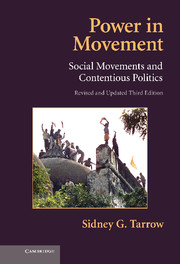Book contents
- Frontmatter
- Contents
- List of Figures
- List of Tables
- Preface
- Acknowledgments
- Introduction
- 1 Contentious Politics and Social Movements
- PART I THE BIRTH OF THE MODERN SOCIAL MOVEMENT
- PART II POWERS IN MOVEMENT
- 5 Acting Contentiously
- 6 Networks and Organizations
- 7 Making Meanings
- 8 Threats, Opportunities, and Regimes
- PART III DYNAMICS OF CONTENTION
- Conclusions: The Future of Social Movements
- Sources
- Index
- Titles in the series
6 - Networks and Organizations
- Frontmatter
- Contents
- List of Figures
- List of Tables
- Preface
- Acknowledgments
- Introduction
- 1 Contentious Politics and Social Movements
- PART I THE BIRTH OF THE MODERN SOCIAL MOVEMENT
- PART II POWERS IN MOVEMENT
- 5 Acting Contentiously
- 6 Networks and Organizations
- 7 Making Meanings
- 8 Threats, Opportunities, and Regimes
- PART III DYNAMICS OF CONTENTION
- Conclusions: The Future of Social Movements
- Sources
- Index
- Titles in the series
Summary
Tan Guocheng is hardly a self-styled labor leader. Age 23 and introverted, he grew up among rice paddies and orange groves far from China's big factory towns. But last month, an hour into his shift at a Honda factory in the southern city of Foshan, Mr. Tan pressed an emergency button that shut down his production line. “Let's go out on strike!” he shouted. Within minutes, hundreds of workers were abandoning their posts
(New York Times, June 14, 2010, p. B1).China is hardly a place where we would expect to find widespread labor insurgency. And, indeed, Tan was fired soon after leading the strike in Honda's transmission plant and went back to his native Hunan. But the action at the Foshan Honda factory triggered strikes all over the Eastern Chinese industrial zone, especially in Japanese-owned firms, which had come to China to take advantage of its cheap and, until recently, docile labor force. Not only that: Unlike most Chinese industrial actions before 2010, which had focused on poor working conditions and wages, this one made a new demand – the right to form a labor union independent of the party-controlled All-China Federation of Trade Unions. Similar to the Solidarity union in Poland, which we will turn to later, Chinese workers were beginning to understand that without representation, their material demands would go unanswered.
- Type
- Chapter
- Information
- Power in MovementSocial Movements and Contentious Politics, pp. 119 - 139Publisher: Cambridge University PressPrint publication year: 2011

